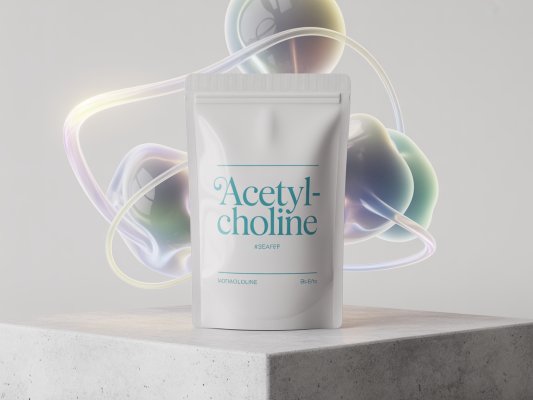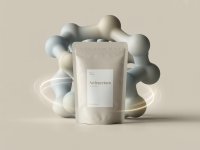
acetylcholine
Description
Acetylcholine (ACh) is a crucial neurotransmitter in both the central and peripheral nervous systems. It plays a vital role in muscle movement, memory, and cognitive function. This article offers a comprehensive yet accessible overview of ACh, its mechanisms, benefits, and how to optimize its function.
Quick Overview: Acetylcholine At-a-Glance
Acetylcholine is essential for muscle contraction, memory formation, and attention. It works by transmitting signals between nerve cells. Supplementation focuses on providing precursors or preventing its breakdown. Best for: Enhancing memory, focus, and supporting overall cognitive health. Typical Dose Range: Varies by precursor supplement (e.g., Alpha-GPC: 300-600mg daily). Key Caution/Consideration: Potential for side effects like nausea or low blood pressure at higher doses.
Table of Contents
Categories & Effectiveness
Learn about our rating methodologyBrain Health
Acetylcholine Support
9/10Strong evidence of effectiveness
Synaptic Plasticity
6/10Moderate evidence of effectiveness
Cognition
Concentration & Focus
8/10Strong evidence of effectiveness
Learning Speed
7/10Strong evidence of effectiveness
Memory & Recall
7/10Strong evidence of effectiveness
Mental Acuity
7/10Strong evidence of effectiveness
Dosage & Side Effects
Recommended Dosage
Potential Side Effects
Bioavailability & Half-Life
Interactions & Stacks
Recommended Products
Klean Labs - DMAE (Dimethylaminoethanol) 150mg pro Kapsel - 200 Kapseln - vegan, ohne Gentechnik, ohne unerwünschte Zusätze & hochdosiert
- Rated 4.6 stars by 49 customers
- Premium quality ingredients
Cholin Komplex mit 3 Cholin Formen - 120 Kapseln - Bitartrat, Citicolin & Phosphatidylcholin in synergetischer Kombination - Ohne Zusätze - Vegan
- Rated 4.5 stars by 83 customers
- Premium quality ingredients
QIDOSHA® Acetyl L Carnitin Kapseln bioaktiv, erhöhte Bioverfügbarkeit, 120 Kapseln/Glas, Acetyl L Carnitin 500mg vegan, bioaktive acetylierte Form der Aminosäure L-Carnitin, in Deutschland produziert
- Rated 4.5 stars by 83 customers
- Premium quality ingredients
As an Amazon Associate we earn from qualifying purchases. Prices and availability are accurate as of the date/time indicated and are subject to change.
Benefits by Use Case
Enhanced Memory
Supports memory encoding and retrieval processes by increasing acetylcholine availability in key brain regions like the hippocampus. This can be particularly beneficial for age-related memory decline or during periods of intense learning. However, individual results may vary.
Improved Focus
May enhance attention span and focus by modulating cholinergic activity in brain areas involved in attention, such as the prefrontal cortex. This can lead to improved productivity and cognitive performance. The effect on focus is influenced by individual cognitive profile.
Mechanism of Action
Frequently Asked Questions
Where to Buy acetylcholine
Based on quality, price, and customer reviews, here are our top recommended acetylcholine supplements:
L-Cholin Kapseln | Cholin Active 500mg High Potency | Für Veganer & Vegetarier geeignet | 120 Kapseln = 2 Monatsvorräte | Hergestellt in Großbritannien nach GMP-Standards
- Rated 4.4 stars by 486 customers
- Premium quality ingredients
Now Foods NAC (N-Acetyl Cysteine), 600mg 3-Tage-Depot, Nahrungsergänzung, 100 vegane Kapseln, Laborgeprüft, Sojafrei, Glutenfrei, Gentechnikfrei
- Rated 4.5 stars by 305 customers
- Premium quality ingredients
EN Cholin | 120 Kapseln Choline Hochdosiert - 700mg Extrakt pro Portion | Cholin-Bitartrat Supplement | Gentechnik-, Gluten-, & Allergenfrei | Hergestellt in Großbritannien
- Rated 4.3 stars by 224 customers
- Premium quality ingredients
As an Amazon Associate we earn from qualifying purchases. Prices and availability are accurate as of the date/time indicated and are subject to change.
Summary & Expert Opinion
Key Strengths: Supports memory and focus, readily available supplements. Key Weaknesses: Effects can be variable, potential for side effects at higher doses. Recommendation: Consider choline supplements if you're looking to support cognitive health, but prioritize a balanced diet and healthy lifestyle first.
For those seeking a deeper dive, the mechanisms of acetylcholine are multifaceted. ACh acts on both nicotinic and muscarinic receptors, each with different subtypes and downstream effects. Muscarinic receptors (M1-M5) are G protein-coupled receptors that modulate various cellular processes, including calcium signaling and potassium channel activity. Nicotinic receptors, on the other hand, are ionotropic receptors that allow for rapid influx of ions like sodium and calcium, leading to fast excitatory responses.
The synthesis of acetylcholine is tightly regulated by the availability of choline and acetyl-CoA, as well as the activity of choline acetyltransferase (ChAT). After release, ACh is rapidly hydrolyzed by acetylcholinesterase (AChE), which is a highly efficient enzyme. Some nootropic supplements, like Huperzine A, act by inhibiting AChE, thereby increasing the concentration of ACh in the synaptic cleft.
Research also indicates that cholinergic modulation plays a crucial role in synaptic plasticity, the brain's ability to adapt and change over time. ACh enhances long-term potentiation (LTP) in the hippocampus, a process critical for memory formation. Furthermore, ACh interacts with other neurotransmitter systems, such as dopamine and glutamate, to fine-tune cognitive processes.
It's important to note that the effects of acetylcholine-boosting supplements can vary significantly depending on individual factors such as genetics, diet, and lifestyle. Some people may experience significant cognitive benefits, while others may not notice any effects or even experience side effects. Therefore, it's essential to experiment with different dosages and supplements to find what works best for you, while also paying close attention to your body's response.










